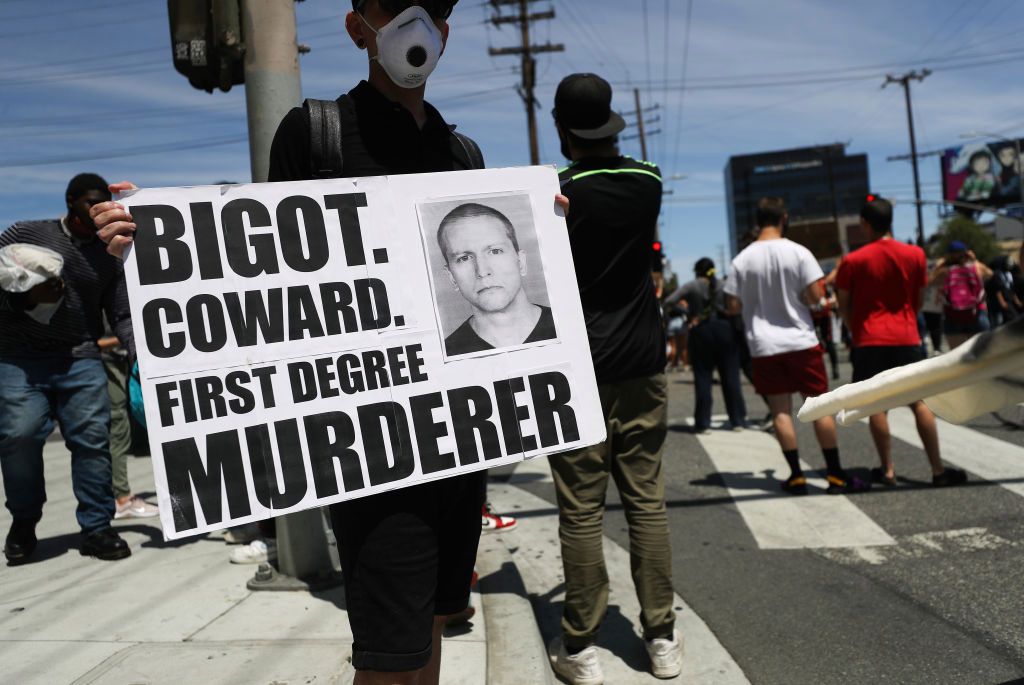Jail Guards ‘Segregated’ Away From George Floyd’s Accused Murderer Sue For Racial Discrimination
Black and brown corrections officers in Minnesota were forbidden from guarding the former police officer accused of killing George Floyd, according to a new racial discrimination lawsuit. The eight corrections officers’ lawsuit also claimed that Derek Chauvin, who used his knee to apply deadly pressure to Floyd’s neck for nearly nine minutes, allegedly received preferential treatment behind bars from a higher ranking officer who is white.
NBC News obtained a copy of the lawsuit that was filed Tuesday. It says in part that the corrections officers suing “were “segregated and prevented from doing their jobs by defendant solely because of the color of their skin.”
The jail-wide policy was not a secret, either, the lawsuit says.
An example of that policy in practice is when one of the officers suing was allegedly stopped from fully frisking Chauvin. A white officer was told to replace him and finish the job, the lawsuit claims.
The lawsuit specifically names Ramsey County Superintendent Steve Lydon as the one who “prevented” the corrections officers from doing their jobs because they were not white.
The same group of corrections officers filed charges against Ramsey County last summer for the same reason. But the charges never achieved the desired effect, prompting the men to decide to go the legal route instead.
One African American sergeant told local news outlet KARE on the condition of anonymity that he “was in disbelief” when he learned about the policy. He said he recalled thinking, “is anybody going to tell him that that’s illegal?”
Lydon might have thought the situation was resolved when he openly admitted to the charges back in June. He suggested at the time that he separated corrections officers of color from the white ones to limit their exposure to a person who may trigger a negative reaction.
Lydon said back then that he realized the error of his ways and that he was sorry.
Of course, Lydon’s reasoning for segregating his officers based on race is flawed as it suggests without proof that the men were incapable of separating their personal feelings from their profession (among other problems).
The lawsuit was filed nearly a week after the New York Times reported that Chauvin had previously employed the same kind of brutal neck restraint he used on Floyd with other Black and brown suspects.
The Minnesota Attorney General’s Office is hoping to introduce these claims as evidence of a pattern of Chauvin’s renegade style of policing that appeared to kill Floyd, who was handcuffed and face-down on a hot street’s pavement during the encounter that spurred ongoing nationwide protests against police violence, racism and what is often times the deadly combination of the two.
Chauvin, who is awaiting trial after being charged with one count of second-degree unintentional murder and one count of second-degree manslaughter for the preventable instance of police violence on Memorial Day, used his knee to apply pressure to people’s necks in at least six other arrests going back more than five years, the Times found.
Four of those people who were arrested are Black and brown, while the races of the other two were not included on the arrest reports.
Zoya Code, a Black mother, described her 2017 encounter with Chauvin and said she pleaded with him, “Don’t kill me.”
Chauvin’s response?
“He just stayed on my neck,” Code said. And then applied more pressure, she said, “Just to shut me up.”
A judge ruled last month that Chauvin will be tried separately from the three officers accused of aiding and abetting murder. His trial is set to begin on March 8.
The other officers, Thomas Lane, J. Alexander Kueng and Tou Thao, who stood idly by as Chauvin kneeled mercilessly, will be tried together in August.
Minnesota Attorney General Keith Ellison said that holding separate trials could have harsh effects on family members and witnesses, forcing them to relieve the incident and subsequent aftermath more than once.
“We respectfully disagree with the court’s decision to sever three of the defendants from the other and its ruling on the timing of the trials,” Ellison said. “As we argued several months ago, and as the judge agreed in his November ruling, we believe all four defendants should be tried jointly.”
Chauvin faces up to 40 years in prison if he is found guilty.
SEE ALSO:
Cop Accused Of Killing George Floyd Has History Of Using Brutal Neck Restraints, Other Victims Say
Derek Chauvin Faces Solo Trial In George Floyd’s Murder Case Due To COVID-19 Restrictions
[ione_media_gallery id=”3956574″ overlay=”true”]

